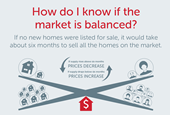
Need to sell your current home and buy another? You may be wondering how to time it just right, so the sales align — or if you should be buying or selling your home first.
We’ve carefully outlined the pros and cons of each decision. Read along for more insights you can use when determining whether to buy or sell your home first.
Selling a home first
You sold your house! Now what? Here’s the inside scoop on the pros and cons of selling your home first.
- Upside: By selling first, you’ll likely feel more financially secure as you begin searching for homes to buy. It can be helpful to know what kind of money you’ll walk away with at closing so you can set a responsible budget for house #2 and feel confident that you can get approved for your next mortgage loan.
- Downside: There’s more to think about than just the money you’d acquire from a sale, though. Consider this: The inventory of homes for sale is low (though new listings are starting to rise) and it may take longer than you think to find your next home.
Some homebuyers are comfortable with the idea of finding a "Plan B" home as a temporary option while they search for the perfect place to plant roots after they sell their house.
If you’re in the process of selling your home, and you’re concerned that you might close on your sale before finding your new home, you’re not without options. Talk to your REALTOR® to see if you can negotiate for a later closing date when accepting a buyer’s offer. This will help you gain more time to find your next property.
Buying a home first
It’s also possible to buy a home before you’ve placed your existing home on the market..
- Upside: By buying a new home before you sell your current home, you can search on your own terms and put an offer on the home of your dreams — rather than being tied to a timeline.
- Downside: If you buy a new home before selling your current property, you’ll have to have enough cash on hand to cover the down payment for house #2, and you may end up paying two mortgages until your first home sells.
If you choose to buy first, be sure to save up as much money as possible in order get approved for a second mortgage and have peace of mind as you commit to paying two mortgages for the short-term (or possibly longer). You’ll also want to hire with a real estate agent who is committed to helping you sell quickly.
Adding a contingency when buying
If you want to buy first, but avoid two mortgage payments, you can try to add a buyer’s home sale contingency in the purchase agreement of your new home. This contingency states that the transaction for the new house is dependent on the sale of your current property.
A seller may perceive a contingent offer as weaker than a non-contingent offer. In a sellers’ market, you may have a more difficult time getting the seller to accept a contingent deal.
Should I buy and sell a home at the same time?
This is a pretty common scenario, especially for homeowners who don’t have a “backup plan” — like the option to move in with family or friends for a few weeks or months.
At first, this may seem like the best-case scenario. Here are a couple of things you might not have considered about coordinating a new home purchase and a property sale.
- Upside: You can time your moves to coincide. This will allow for a seamless transition from one house to the next — packing up a van and relocating a few miles away is about as easy as a move can get.
- Downside: It can be a challenge to stage your for-sale home and keep it clean for showings, all while touring other homes, making offers and negotiating coinciding closings.
Shh! We're sharing home selling secrets and pro tips (for free!) in our Ultimate Guide to Selling Your Home.
Get your free guide
So, what’s the best plan?
Unfortunately, there’s no cookie-cutter answer to this question. All homeowners are different, with unique finances, timelines and other logistical factors (like school and work schedules, family trips, short-term living options, etc.) that can impact what’s smartest for them.
And, homes are different, too! In an area without many homes for sale, sellers can accept an offer on a home in just a few days or even hours — while sellers in a higher-inventory market, or who price their homes too high, may wait months for just one offer.
All in all, the perfect option for one seller might not work for a different seller, even if they live on the same block. No matter what, your Realtor can help you weigh all your personal and financial factors to determine if you should sell your home first, buy a home first, or buy and sell at the same time.
Key points and next steps
Ready to get a move on buying or selling a home — or both? Reach out to Edina Realty’s customer care team; they’re able to connect you with an expert seven days a week.
Additional resources to consider:
The Ultimate Guide to Selling Your Home
I want to list my home for sale - now what?
Prepare your finances to buy a home
How to sell and buy a house at the same time
Home sale contingencies for buyers and sellers








